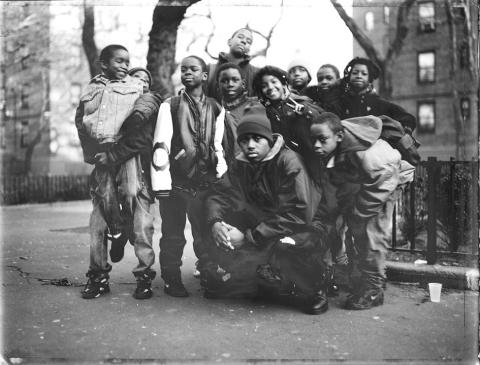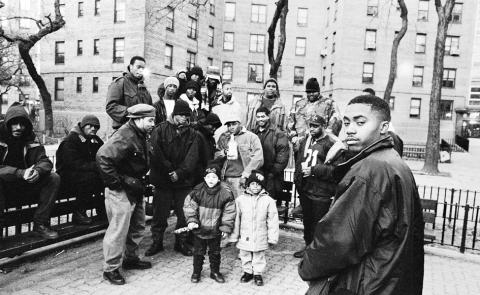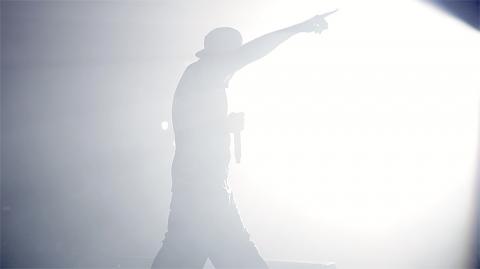Twenty-one years ago, Nas released Illmatic — and the hip-hop world came to a standstill. Dubbed an instant classic by music critics and fans alike, Nas’ debut album interwove poetic tales about dilapidated New York City streets with grimy beats by Large Professor, Q-Tip, Pete Rock and DJ Premier.
For One9 (real name Michael Baluyut-Silverman), who will be in Taiwan for the Urban Nomad Film Festival this Saturday for a screening and Q&A about his film, Nas: Time is Illmatic, the rapper’s album was raw and visual.
It was “a lyrical delivery so prolific that I had to keep replaying every track,” One9 said in an email interview with the Taipei Times.

Photo Courtesy of Danny Clinch
He added that it was akin to “seeing images of death and pain” told through hopeful stories. “When you make something so raw and honest that shines a light, you shape lives and inspire a culture.”
10 YEARS IN THE MAKING
On the tenth anniversary of the album’s release in 2004, One9 was contacted by Erik Parker, a music editor at Vibe magazine about making a DVD about Illmatic. They interviewed Nas’ father, jazz musician Olu Dara, as well as the album’s producers, and they cut a trailer. Eventually, Parker and One9 also met with Nas and received the green light from him. After 10 years of hard work and a research and production grant, the film was starting to take shape.

Photo Courtesy of Danny Clinch
One9 said they looked at several ways to create a narrative by using song titles from the album as metaphors for larger social issues.
“All these issues painted a picture of what Nas’ life was like growing up so viewers could feel the intensity of the lyrics that came out of those situations.”
The film was chosen as the Tribeca Film Festival’s opening movie in New York City last year. Although seeing a full house was satisfying, that was nothing for One9 compared to Nas’s own reaction and that of his family’s.

Photo Courtesy of Ari Issler
“The biggest compliment was talking with Nas and he said the movie is equivalent to the album Illmatic as far as feeling and impact,” One9 said.
He added that he spoke to Nas’ father who said it was “the best ghetto film he’d ever seen.”

In the March 9 edition of the Taipei Times a piece by Ninon Godefroy ran with the headine “The quiet, gentle rhythm of Taiwan.” It started with the line “Taiwan is a small, humble place. There is no Eiffel Tower, no pyramids — no singular attraction that draws the world’s attention.” I laughed out loud at that. This was out of no disrespect for the author or the piece, which made some interesting analogies and good points about how both Din Tai Fung’s and Taiwan Semiconductor Manufacturing Co’s (TSMC, 台積電) meticulous attention to detail and quality are not quite up to

April 21 to April 27 Hsieh Er’s (謝娥) political fortunes were rising fast after she got out of jail and joined the Chinese Nationalist Party (KMT) in December 1945. Not only did she hold key positions in various committees, she was elected the only woman on the Taipei City Council and headed to Nanjing in 1946 as the sole Taiwanese female representative to the National Constituent Assembly. With the support of first lady Soong May-ling (宋美齡), she started the Taipei Women’s Association and Taiwan Provincial Women’s Association, where she

Chinese Nationalist Party (KMT) Chairman Eric Chu (朱立倫) hatched a bold plan to charge forward and seize the initiative when he held a protest in front of the Taipei City Prosecutors’ Office. Though risky, because illegal, its success would help tackle at least six problems facing both himself and the KMT. What he did not see coming was Taipei Mayor Chiang Wan-an (將萬安) tripping him up out of the gate. In spite of Chu being the most consequential and successful KMT chairman since the early 2010s — arguably saving the party from financial ruin and restoring its electoral viability —

It is one of the more remarkable facts of Taiwan history that it was never occupied or claimed by any of the numerous kingdoms of southern China — Han or otherwise — that lay just across the water from it. None of their brilliant ministers ever discovered that Taiwan was a “core interest” of the state whose annexation was “inevitable.” As Paul Kua notes in an excellent monograph laying out how the Portuguese gave Taiwan the name “Formosa,” the first Europeans to express an interest in occupying Taiwan were the Spanish. Tonio Andrade in his seminal work, How Taiwan Became Chinese,